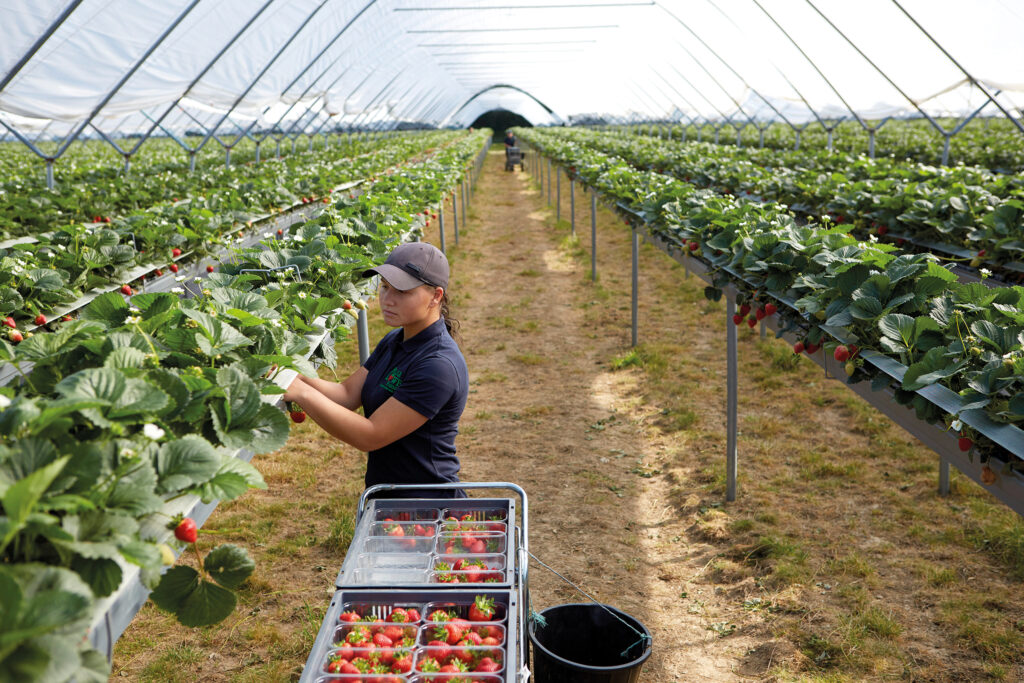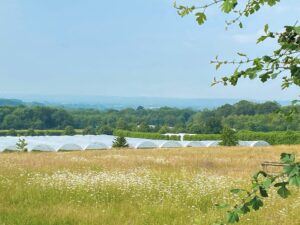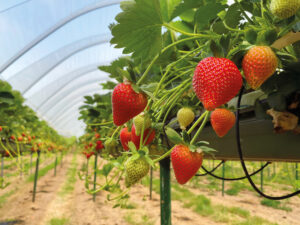Fruit Grower Profile: Hugh Lowe Farms
2nd October 2023
Having grown fruit since Victorian times, Hugh Lowe Farms has a strong sense of tradition embedded into its practices. However, owner and managing director Marion Regan believes growth is driven by moving along with time, as well as having an unrelenting passion for growing better fruit, year after year.

Owner and managing director Marion Regan
Grower profile:
- Grower: Hugh Lowe Farms
- Location: Outside Mereworth, Kent
- Farm size: Over 700ha. Only a third of the farm grows berries, the rest is divided between arable crops and land managed for wildlife
- Soil type: Predominantly sandy loam
- Fruit grown:
- Strawberries: Malling Centenary; Driscoll’s varieties Katrina, Jubilee, Beatrice and Zara; as well as Favori and Murano
- Raspberries: Driscoll’s Maravilla and Sofie
- Grape varieties: Chardonnay, Pinot Noir, and Pinot Meunier
- Blackberries: Victoria
An introduction to Hugh Lowe Farms
From humble beginnings in 1893, Hugh Lowe Farms has prospered into one of the largest soft fruit growing establishments in the UK, comprising 700ha just outside Mereworth in Kent. However, not all land on the farm is used to grow fruit, as Marion believes in both sharing and sparing space for nature.
“In terms of sharing, while we’re growing all of our soft fruit in substrate under polytunnels, we use biological control for crop protection, and we rely on native pollinators and honeybees and some introduced bumblebees,” she explained.
“We rely very much on nature to grow the crop, but we also spare quite a lot of our land for permanent grassland, for woodlands, and for things like wild birds, cover crops, field margins, reservoirs etc.”
Having grown up on the farm, Marion has always regarded Hugh Lowe Farms as a family business, despite significant expansion over the years. She took over operations from her father in the 1990s and has been running the farm ever since with her husband Jon and daughter Amelia, who is now a fifth generation grower.

The farm is situated on mostly free-draining sandy loam soils – ideal for fruit and vine growing
Harnessing the power of nature
Before switching to a substrate-based production system, Hugh Lowe Farms used to have a more dynamic landscape, with soft fruit plants in rotation with arable crops and grassland. However, in the current layout, opportunities have opened up to give a number of fields back to nature.
Alongside rewilding projects, Marion and her team have been working on reducing the number of tillage passes on arable fields and using cover crops to improve the soil and deter weeds.
With a vision of increasing carbon sequestration on the farm, Marion conducted a complete baseline soil survey across all land, including under tabletops, testing for organic matter, pH, macro- and micro-nutrients and other indicators.
According to the results, the farm is situated on mostly free-draining sandy loam soils – ideal for fruit and vine growing – with some areas on heavier ground.
On the pollination front, bees are an increasingly important focus in the system, and Hugh Lowe Farms works with its own hives and beekeeper. Marion spoke of two key aspects regarding pollination: “One is, because we crop both early and late, sometimes we have crops in flower before honeybees are very active, so we use native bumblebees, because they’re very furry and good at flying at lower temperatures.
“The second aspect is, we really encourage native pollinators and have done quite a lot of work on hoverflies and solitary bees etc.
“We’ve been working quite closely with NIAB on field margins and how we can encourage better penetration of native beneficial insects into the crop itself,” she explained.
The three pillars of integrated pest management
To minimise reliance on chemical sprays, Hugh Lowe Farms uses an integrated pest management (IPM) system to control pest and diseases. According to Marion, the three pillars underpinning the farm’s IPM strategy include:
- Using polytunnels, which not only allow for smooth cultivation and harvesting work all year round, but also better management of fungal infections, such as rots and moulds.
- Moving fruit crops out of the soil into coir substrate, which has reduced soil borne diseases and to some extent soil borne pests on the farm; once the coir has sustained several crops, it is composted and recycled to improve soil structure on arable fields.
- Professional, hygienic picking, as well as having a great seasonal workforce and keeping on top of a tight picking cycle.
Biological enemies such as pirate bugs and predatory mites are also employed to counteract the biggest intractable pests on the farm, like western flower thrips (WFTs), she added.
“Hoverflies, ladybirds, lacewings and pirate bugs all eat damaging crop pests and we encourage them into our tunnels. Biocontrol also makes use of ‘good’ fungi to destroy moulds like mildew. This approach means we have reduced or eliminated many sprays.”
Fortunately, spotted wing drosophila (SWD), which is an economically damaging pest in soft fruit worldwide, has been kept out of crops on the farm so far.
In a move towards utilising the latest technology, Hugh Lowe Farms has trialled ultraviolet treatment against mildew, which proved to be effective and will be performed more in the future. Crop and pest monitoring also allow any hot spots to be treated promptly and efficiently.
While the ultimate goal is to reduce the farm’s environmental impact, Marion believes that abandoning all chemical control methods would be a mistake.
“In terms of chemical controls, there are some that are absolutely essential as a last resort, and I think we’re doing quite a good job as an industry in making the case for how one can have a predominantly biological program but still have a useful armoury of pest control products, which we need to maintain,” she stressed.

Polytunnels form part of Hugh Lowe Farms’ integrated pest management system.
Never standing still
Being one of the largest fruit growing operations in the UK means there is no such thing as a quiet hour on Hugh Lowe Farms. While the orchards and vineyards enter a period of dormancy over winter, workers on the farm are busy planting replacement crops, pruning, cultivating, and preparing for the season ahead.
To create ideal growing conditions, the polytunnels are equipped with a range of sensors recording temperature, humidity, light and moisture levels. Specialist growers then walk the crops every day, interpreting the data and ensuring production efficiency is at maximum.
During the wetter months, rainfall is collected from the tunnels and piped directly into the roots of each plant according to its irrigation needs. Marion is also looking at switching to more renewable energy and integrating solar panels into soft fruit production.
Picking starts in the glass houses in April and under tunnels in late April/early May. Marion aims to welcome back workers who have been coming to the farm for several years, as training a good fruit picker is an expensive and lengthy process. However, new workers are also welcomed onto the farm each year through the Seasonal Worker Scheme.
At the height of the season, Hugh Lowe Farms works with around 900 staff members, including a 65-strong permanent workforce who carry out a variety of jobs on the farm. A pleasant work environment is considered a fundamental part of running the business, therefore Marion likes to maintain a productive and respectful atmosphere.
Berries are picked very early morning, especially during hotter days, when picking may start at 5am. Harvesting is then finished just after midday, with the fruit dispatched to the packhouse to be chilled and packaged for customers.
Fruit is quality-checked every step of the way, passing several trained eyes, as well as quality control detectors in the packhouse to ensure only the best berries leave the farm.
Soft fruit harvest at Hugh Lowe Farms stretches all the way to the end of October and in the glass houses into November. In the run up to Christmas, Marion is busy with budgeting and forecasting, looking at new innovations, and talking to customers about their needs.
Growing for quality
A range of different varieties are grown on the farm to supply different markets, and preferences vary across retailers, Marion explained.
“They all like the premium strawberry variety we grow called Driscoll’s Zara,” she noted, adding that Driscoll’s Maravilla has been a favourite raspberry variety.
As a member of Berry Gardens Growers, Hugh Lowe Farms markets its soft fruit to multiple retailers through an exclusive arrangement with Driscoll’s, a California-based soft fruit breeder. Meanwhile, the grapes are sent to Chapel Down winery to be made into English sparkling wine.
For any fruit that can’t find a Class 1 market, the business has an arrangement with Sipsmith Gin which produces strawberry gin with fruit grown at Hugh Lowe Farms.

Retailers all like the premium strawberry variety Driscoll’s Zara which is grown on the farm.
Challenges and future plans
2022 was a challenging year for many growers across the UK and worldwide, and Hugh Lowe Farms was no exception. Located in the South East, the heat and drought throughout last summer had a substantial effect on the farm’s soft fruit production, Marion remarked.
Although yields were good compared to previous years, this also caused the market to be oversupplied with fruit, resulting in marketing challenges. “The way in which the fruit was sold didn’t seem to grow the market,” she said, suggesting the cost-of-living crisis could be a possible cause.
She also mentioned the cost of production of fruit is not currently being recognised by the market, and a big challenge that growers are facing this year is trying to persuade both customers and the consumer that fruit is fantastic value for money.
As for Hugh Lowe Farms: “The two big challenges are sourcing experienced labour and making the case to customers that, as growers, a lot of our costs have gone up dramatically,” she explained.
Despite the current volatile climate, Marion wants to continue growing the business, making it more sustainable, and building resilience. She also has an ambition to automate and mechanise tasks such as removing leaves, tying in canes and brush weeding by bringing machinery in from the vineyard industry.
Ultimately, Hugh Lowe Farms is all about producing high quality fruit with provenance and transparency while being kind to nature, people, and the planet.
